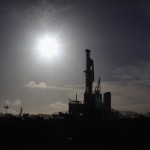What Will Hundreds of Water Tests Reveal About Drilling in Texas?
“In Texas, I don’t think there’s anybody else doing quite what we’re doing,” says research scientist Kevin Schug.
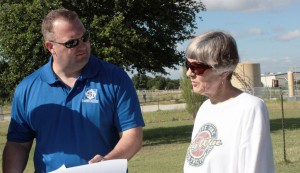
Dave Fehling / StateImpact
Becky Burke's home in Denton County has a water well in her side yard and a gas well in the front yard
What Schug is doing can be found in a two big kitchen refrigerators in a lab on the campus of the University of Texas at Arlington. The fridges are crammed with hundreds of plastic bottles containing samples from private water wells located mostly in North Texas, but some of them in West Texas, too.
The project hopes to determine if drilling for oil and gas and burying chemical waste generated by the work is contaminating groundwater. The project is not sponsored by Texas environmental regulators nor the oil and gas industry but rather by UT Arlington. UT’s Bureau of Economic Geology is also involved.
“At the university here, we can stand in a neutral case and look at this very objectively using analytical techniques that can say whether there is or is not an impact,” Schug told StateImpact Texas.
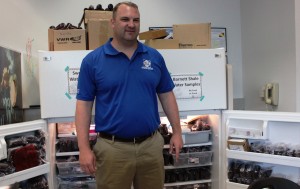
Dave Fehling / StateImpact
Research chemist Kevin Schug with fridges full of water well samples
Results from an expected total of 550 well water samples won’t be made public until this fall, but Schug hints at one set of results from a ranch in Nolan County, just west of Abilene. Unlike many of the wells tested where drilling had already taken place nearby, researchers were able to take water samples in Nolan County before and after oil drilling took place. (Water samples taken before drilling begins are also known as ‘baseline testing.’)
“About all I can say right now [is] we do see some changes in parameters over time, but I’m really not at liberty to speak about that until the paper goes out for peer review,” Schug said.
An initial analysis of samples from 100 private water wells near drilling sites in the Barnett Shale region of North Texas found a third had seriously elevated levels of heavy metals, including arsenic. But the metals occur naturally in soil, and a definitive link to drilling was not made.
Some States Require Testing
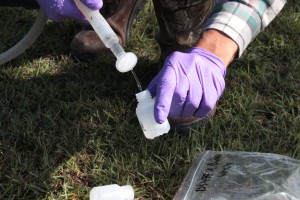
Dave Fehling / StateImapct
UT-Arlington researcher Zac Hildenbrand captures sample of well water in Denton County
State-required testing of groundwater before and after drilling for oil and gas took affect earlier this year in Wyoming. A similar rule for baseline testing has been the law in Colorado since last year, and Ohio also requires baseline testing.
But not Texas.
“The Railroad Commission does not require oil and gas operators to conduct baseline water testing before drilling, but some operators choose to do this on their own. There are no proposals at the Commission that I’m aware of for such a rule or requirement at this time,” wrote Ramona Nye in an emailed response to StateImpact Texas. Nye is a spokesperson for the Railroad Commission of Texas, which regulates drilling.
Last month, a Railroad Commission report on complaints of methane gas in water wells in Parker County said the gas was not from nearby drilling.
Nye said recently-updated rules for how wells are drilled “ensure groundwater is not impacted by oil and gas activity.” But some water experts, including a manager of a North Texas groundwater district, have voiced strong concerns that a lack of state regulation, particularly of waste pits at drilling sites, is raising the risk of groundwater contamination.
Homeowner: ‘It’s Frightening’
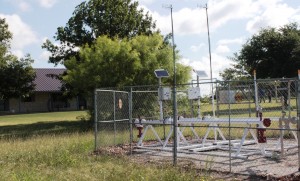
Dave Fehling / StateImpact
The Railroad Commission of Texas says its rules protect groundwater when oil & gas wells are drilled near water wells
One of the samples taken by the UT Arlington scientists came from a water well in the side yard of Becky Burke’s house in Denton County. A stone’s throw away in her front yard is a gas well drilled in 2002 (photo at right).
“Back when this all happened, we were excited about it. It looked like revenue, a good opportunity,” Burke said, referring to royalty payments landowners receive from leasing land to oil and gas companies.
But over the years, Burke said she began reading about concerns that drilling could endanger groundwater in Texas and other states where drilling has surged. Burke said she and her family drank water from their well for years, but have recently stopped.
“To be honest with you, I was diagnosed with Parkinson’s disease in 2010,” Burke told StateImpact Texas. “Earlier this year, I attended a seminar and one of the doctors suggested groundwater could be one of the culprits for Parkinson’s disease. So I’m very interested in knowing if there could be a correlation.”
“It’s frightening,” Burke said. “I’m certainly curious about it. And the more you read and learn, the bigger the concern.”
